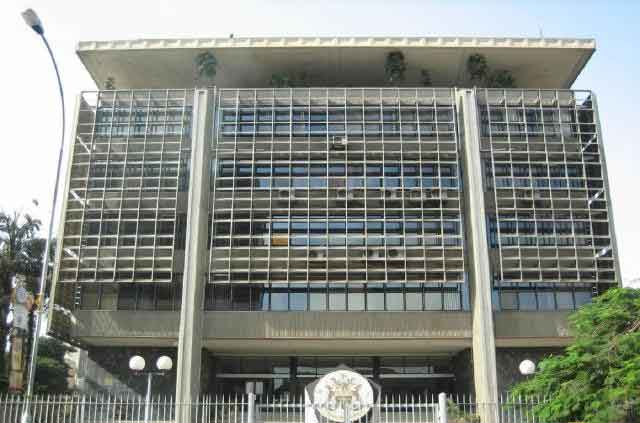
THE LAST WORD | ANDREW M. MWENDA | Since the NRM government fully embraced neoliberal reforms in 1992, Uganda has witnessed the growth to dominance of multinational capital in our economy and with that the equal decline to near-insignificance of local/national/domestic/indigenous capital. But this has only been successful because the ideas we so easily embrace help undermine the development of local/national/domestic capital and facilitate its takeover by multinational capital. Many of the economic woes Uganda suffers spring from this disease.
On August 4, I was visited by two bankers from one of our leading multinational banks, which I will not name out of curtesy. I wanted to borrow some money from this bank. They told me that they could only lend me up to 70% of the value of my assets which I was willing to mortgage to them. They were shocked when I told them that I want to borrow up to 200% of the value of asset I was willing to mortgage. They asked in shock: how is that possible? I told them that given my long credit history with their bank, they had every reason to trust me. They could not digest this.
Many Ugandans believe that to borrow you need security in form of land or house. This is actually not the case in many countries. I told the Ugandan bankers who had come to my office that I have a black American Express (AMEX) card which has no credit limit i.e. I can spend on it as much as my appetite for consumption can allow. Yet I have never visited an AMEX office, I have never met an official of the company. The closest I have related to them is via an anonymous person on a telephone call, itself handled by a call center based in Bangalore, India.
Then how did you get the AMEX card, they asked me. When I was living in Palo Alto, a very rich part of California and capital of the Silicon Valley, I got a letter in mail offering me an AMEX gold card, which I promptly accepted. Later it was upgraded (at my request but based on my credit history) to platinum before upgrading me to black. So, a company whose managers don’t know me, whose employees have never seen me, and a company based in USA that knows that I live in a remote part of the world called Uganda, basing purely on my credit history can allow me to spend an unlimited sum of money without any security.
Meanwhile a bank in Uganda whose CEO is personally known to me, where I have had five mortgages previously and paid all of them on schedule without a single default for 15 years; a bank whose branch managers and nearly all employees know me well, cannot lend me any money except after producing a mountain of documents and proof of income. And more than that, it can only lend me up to 70% of the value of the asset I am willing to mortgage with them. What explains this irony?
There are two problems with the Ugandan banking sector but they are closely interconnected. One is central bank regulation. The rules that govern commercial banking regulation under the FIA of 2003 were picked from an IMF and World Bank rule book. They are designed to literally eliminate local banks and Ugandans from borrowing in any meaningful way. The others are rules multinational banks have instituted at their headquarters to manage their subsidiaries in Uganda. Both rules are self-reinforcing as they are based on the belief that Africans are not trustworthy and should thus be subjected to tight controls on borrowing.
This is where President Yoweri Museveni, in his naïve embrace of neoliberal policies, missed the point. The colonial state had instituted such rules that excluded Africans from meaningful participation in the economy largely because of racist bias. The anticolonial struggle for independence was actually a struggle to reject this kind of exclusion. Because there were no local capitalists to open banks, the state took over this role using such institutions as Uganda Commercial Bank (UCB).
By mid 1990s, UCB like many other state enterprises was suffocating under the weight of mismanagement, corruption, incompetence, etc. and was technically bankrupt. Although this was part of the wider institutional crisis facing Uganda whose state and economy had collapsed, the international financial institutions convinced Museveni that this was because of state ownership. The solution was therefore to sell it. And who could buy it? Multinational capital in form of Stanbic bank.
It was an ideological but also a self-serving argument. Sadly, I admit I was one of the zealots in support of blind privatisation, liberalisation and deregulation – including of UCB. Looking back, one can see how wrong we were. The army in Uganda had performed much worse than UCB. Could the solution have been to privatise it to some private company like Executive Outcomes (as Sierra Leone did) or to the UN? If we could reform the army, the civil service, the police, why not UCB? The case for neoliberal reform was so well crafted that we never asked these questions.
Thirty years later, we can only see the consequences. Uganda’s business graveyard is littered with tombstones of local banks, insurance firms, manufacturing companies, construction corporations, some owned by the state others by the local businesspersons. In their place, the lords of multinational finance have taken control. Reform either displaced or stifled local firms. Thus, while Uganda has sustained impressive rates of GDP growth for more than three decades, there has been little or no structural transformation. One reason is that most of the profits made are shifted as dividends to shareholders abroad. This is not to mention transfer pricing, tax evasion, smuggling – the benefits of which all go abroad.
To return to foreign owned commercial banks that control 90% of Uganda’s credit market: many of them do not even need to lend to the local business community. They can just buy government treasury bonds at 15%, make huge profits and ship the money abroad. Essentially Uganda government’s persistent fiscal deficit means that these banks are made fat, not by growing local businesses through lending, but for buying government paper. We pay them to take our money abroad. Their rules and those of our central bank reinforce this behavior. But all this works because ideologically, we the local elites believe it is the right thing to do.
****
 The Independent Uganda: You get the Truth we Pay the Price
The Independent Uganda: You get the Truth we Pay the Price



Transfer this very argument to the UMEME scenario….. Then, you would save yourself from being wrong again.
Well Said Andrew Mwenda. I couldn’t agree more with you, especially in the last sentence “But all this works because ideologically, we the local elites believe it is the right thing to do.”
The local elite and it’s Siamese twin, the ruling class sold this country years ago, and we the citizens are paying a very high price for it everywhere we go. Personally, I gave up on borrowing from Ugandan banks years ago for the same reason Mwenda talks about in this well written article. Giving up on borrowing meant I had to give up on my long-held dream of being running and growing my professional practice and healthcare business. Recently I made the painful decision to go abroad for post-graduate studies, and then seek opportunities in the developed world after completing my studies. Why? Because as Mwenda puts it, the financial system does not allow you to borrow meaningful amounts of money, that in turn can be used for meaningful and worthwhile investment that delivers a rate of return that rewards my effort and risk taking handsomely.
Sadly, I have to join the long line of professionals and non professionals leaving this country we call home for greener pastures abroad. I won’t be the last to do so.
I.recall you Andrew making a similar argument on the Capital gang so many years back. Sadly little has changed in the financial sector. This is despite the fact that at the helm of this mess is Uganda’s best brains in Finance and Economics. And as you can see a battered economy where speculation is key government activity is what we have. And if you have noticed, most of the multinational actors seem to come from one side of the globe .India and Pakistan this comes as some of the familiar traditional players from the west are quietly closing shop and shipping out. Next time you buy a safety razorblade check the origin and quality. This can only mean one thing, the decision makers lack strategy and everytime I see a respectable man like the Hon.minister of finance make a clown of himself I cringe at my past support of this direction when I first heard of it. And I know this is the jitters we all see when angry youths in red bandanas.
Thank you.
You always insist that issues should be considered in their specific context. Why are you comparing an American Bank with a bank based in Uganda-the lending practices and ways of doing things? Uganda’s problem is bigger than your simplistic argument. Have you asked yourself why Post Bank which fully government owned cannot lend up to 200%? Would any big government bank (e.g the former UCB) survive under the current corrupt and predatory system? Will Uganda airlines be commercially viable? Why is Kenya commercial bank everywhere in the East Africa. I can’t give a simple answer to such questions, but suffice it to say that having leadership that cares goes a long way to mobilising and motivating the educated people that Uganda has-to plan and redress some of those challenges.
I can also tell you that he is lying on one thing . Limitless credit cards do not exist for ordinary people like him. I lived in North America for many years. If he really was able to get a limitless credit card, he must have had a guarantor with limitless resources such as a company like Google or a government. This raises alot of questions for me.
Clickbait. Title and pictures of the article are unrelated to the article content.
Mr. Museveni interpreted economic liberalaization to mean deregulation.
Mr. Museveni misinterpreted economic liberalisation for deregulation.
Andrew your assessment of the weird policies of our local banks is spot on!
The only thing I am wondering Andrew is why an financially savvy person as you claim to be holds an Amex card that has a $700 annual fee , yet you live in Uganda and to the best of my knowledge can never benefit from the full range of Amex offers that is available to US permanent residents only? Any well knowing American resident knows that these cards are credit traps, you are basically paying Amex free money that is why they gave it to you realizing that the appearance of prestige sells the product. Many people get these offers and wise financial brains stay away from these cards unless you earn over $500k per year ,…which I think you don’t
We have never been really independent
In whose head are we to drum these in order to see change, Mr. Mwenda?
Well written. I’m always intrigued when we look for foreign investors … in sectors which, with a little push from GOU … local investors could thrive.
Uganda airlines is hardly out of it’s diapers but it is already staggering under the weight of government incompetence and corruption. If IMF hadn’t saved us by compelling government to quit doing business, all those government corporations would be administered by cadres that fail at elective positions. The pilferers of state resources have proved to be inaccessible that even the all powerful head of state is reduced to lamenting. For that reason I feel the solution lies outside current government intervention.
Andrew your assessment of the irrational policies of our local banks is spot on. However you fail to realize that Amex Bank offers ” free credit” on the spot because of economies of scale. They know that for every ten people who get a credit card, four may never pay back the money…however since they have tens of millions of customers , those who pay back are subsidizing the defaulters. The US banking systems operates on trust with only your SSN they can track you down to your grandmothers house very quickly if you default; But in Uganda there are very few people applying for this credit and our small banks cannot afford overexposure to risk. Even reputable people will bribe judges or use state patronage to avoid paying back loans. Local banks just cannot be bothered to fight these battles; the cost and time needed to get that money back is not worth it so they institute front-end policies that filter unserious borrowers.
The only thing I am wondering Andrew is why a financially savvy person like you holds an Amex card that has a $700 annual fee , yet you live in Uganda and to the best of my knowledge can never benefit from the full range of Amex offers that is available to US permanent residents only? Any well knowing American resident knows that these cards are credit traps, you are basically paying Amex free money that is why they gave it to you realizing that the appearance of prestige sells the product. So once again the imperialists have won you over by offering you a credit card whose interests payments go the rich 1% in the USA.
Africa is the right continent with the wrong people. It has more natural resources than any other continent on the planet earth, but its people are extremely poor. Africa needs a radical transformation in terms of how its inhabitants think and act. To achieve this, great ideas and visionary leaders are needed. Here in East Africa we have had the privilege of having two or three people who really wanted or want to see a better Africa or a better East Africa. Mwalimu Nyerere, PLO Lumumba and Magufuli are a case in point.
Mwalimu Nyerere died preaching self-reliance, PLO Lumumba travels around the continent telling Africans to stop depending on foreign aid, grants, ideas, etc. and Magufuli (his mistakes aside) died preaching and doing the same thing. As an African and a Tanzanian, I was happy with his ideas and most of his steps because I knew he was doing his best to make our nation better. He clearly articulated the agenda of his government at the very beginning of his leadership and died implementing it.
But when I look around the continent now, I see mediocrity and childishness everywhere. And the whites and East Asians can’t stop smiling!
I can also tell you that he is lying on one thing . Limitless credit cards do not exist for ordinary people like him. I lived in North America for many years. If he really was able to get a limitless credit card, he must have had a guarantor with limitless resources such as a company like Google or a government. This raises alot of questions for me.
1.Most Ugandans prefer International companies; Tell me how many Ugandans use UTL ?How many have accounts in Post Bank?When you tell a Ugandan to choose between dinning in Hotel Africana and Sheraton they will definitely chose Sheraton.
2.The value of money varies its not definitely for fun ;For example the value of the Pound Sterling,Dollar,Rand,Euros are not the same it depends on the international demand for their money and the level of Economic development of a nation’.
3. Savings is the way to go;Those who obtain long term longs end up paying interest of about 40% on the Loan which makes no business sense.
I am glad that you are coming to truth in discussing the real bottlenecks for our socio-economic liberation. But that it has taken you this long, and yet you are a well read, exposed elite in Uganda’s aristocracy, gives me chills. It can only suggest that many of your contemporaries responsible for the serious decisions of this country are acting in either ignorance or selfishness or both, all the way up to the CIC. If we always say that the previous governments of Obote, Amin and others did not have a clear and good grasp of the problems facing this country, what about the current crop? Can they actually liberate this country? Or did they internalise the problem, saw how big a task it would be, and simply chose another side, quietly saying, let that be fought by another generation! And that would mean NRM took the easier way out. And that would make them sell-outs.